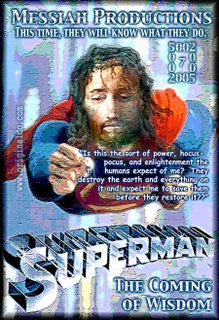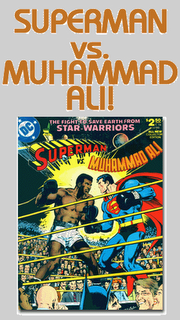June 29, 2006
mini sketches: the beauty of enterprise
- Did Coca-Cola Black already bomb? Or has it yet to be released? It had/will have essence of coffee!
- The new Wayans' film Little Man appears unwatchable. Is it possibly not an actual film but rather a social experiment being conducted by a consortium of universities?
- How fantasic have Red Stripe's commercials been lately? I've seen two really outstanding takes, one about teaching white people how to dance, and the really amazing "buy the beer in the ugly bottle." I'm going to use the word brilliant now. They're brilliant human beings. Well done Jamaica. I'm seriously going to buy a case of Red Stripe beer to honor these simple yet glorious ads. Hooray Beer!
- How much money would you pay to not watch Little Man?
- I have it on good authority that The Lake House is as bad as we feared. Some critics have given it a passing grade, but my source - whom I trust entirely - confirmed our suspicions.
- why do we continue to spell the word "colonel" this way? Isn't it time for a change? Shouldn't we at least add an r? From now on, let's spell it "kernal."
- "They don't have enough people to handle me." Neil Rockind is a genius.
June 26, 2006
superman gets all biblical on us
They can be a great people Kal-El. They wish to be, they only lack the light to show the way. For this reason above all, their capacity for good, I have sent them you, my only son.
If you've never thought about this before and you want to read about how Superman and JC are parallel figures, some guy wrote a seemingly scholarly essay about it. Before we dig in to the real point of this essay, here's one good example of how they're similar according to Anton Karl Kozlovic, whoever he is:
Superman was an alien immigrant, and like a diaspora Jew, he was forced to leave his starry home (a threatened Krypton) to find a new life amongst strangers in a strange land (Earth). Later, he would again leave his home (Smallville) to live in the Arctic wilderness (ensconced inside the Fortress of Solitude). And then for a third time he would leave his Arctic home to live in a bustling urban city (Metropolis) going about his heavenly Father'’s (Jor-El'’s) work. Likewise, Jesus left his celestial home in the heavens to come to the Earth realm. Later, he left his rural home Nazareth (an ancient Smallville) to wander through desert wildernesses, followed by missionary work throughout the Roman-dominated world while doing his heavenly Father'’s (Yahweh's) work.
And here's a lesser example:"Interestingly, Christopher Reeve had bright blue eyes. This is part of a long tradition of celluloid saviours having blue eyes. For example, Jeffrey Hunter in King of Kings had 'dreamy blue eyes.'"
So that's all very interesting, sure. I didn't know they picked Reeve because of his lovely blue eyes. However, I'm not concerned over whether this metaphor actually works. Instead, I'd rather waste a few minutes thinking about why a Jesus/Superman metaphor matters in the first place. Because my first reaction was, even if it's a perfect metaphor, so what?
CNN delivers a well-rounded summary of the Superman as Christ comparison, which is a worthy a read of you're interested. It also gives us a look at the evolution of his symbolisms. According to the article, Superman was created by a pair of Jewish men in the 1930's who were "inspired by the Old Testament story of Moses and the supernatural golem character from Jewish folklore." During the same time, Superman is also said to have been "a hero of the New Deal, aiding the destitute and cleaning up America's slums." It goes on to say that "by the 1950's, fears of postwar urban lawlessness had turned him into a tireless crime fighter." However, based on my limited research, the idea of Superman as Christ didn't seem to emerge until the 1978 movie starring Christopher Reeve.
So basically, Superman was created as a character of strength and justice for the Jews, and was reinterpretted over and over to fit the crises of the times. There's a Superman for every season apparently. He's your Personal Superman. Take this for example (from the CNN piece): "Some have also seen the hero as a gay icon, forced to live a double life with his super-self in the closet." Obviously the Superman character has built a history of becoming a symbol for whatever people want him to be. Shaq thinks Superman symbolizes himself:
Wow.
Anyways, if I created Superman and he was intended to symbolize Jewish strength, would I be pissed that other writers took him away from that? No less to symbolize the Christian Messiah?
This reminds me of those English professors I had who tried to apply deep symbolic meaning to every story, play, sonnet, limerick and essay we ever read. Sometimes I was convinced they were just making stuff up. "Green Eggs & Ham" in college would surely stir a discussion about feudalism in the Dark Ages.
I think profs love to do this because, when a story carries a deeper weight in its subtext, it gives the story a level of literary legitimacy. For instance, Jack London's "The Call of the Wild" comes to mind. While I admit now that my prof was right, at the time I hated the book so much that I was unwilling to believe it carried any significance. For me, it was almost impossible to read, some random narrative about a tough-minded dog. I mean, I could write a book about my cat and his struggles for daily survival, and although it would probably lack London's Gander Mountain prose, it would still be about the same things, right?
Of course, "Call of the Wild" isn't just about dogs and wolves and dogs becoming wolves. COTW is a product of its time, a story about Darwin's Survival of the Fittest theory, and it was controversial enough that it was banned by some institutions (I have no source material for you, so...you're kinda gonna hafta trust me here).
Now I don't question COTW's literary legitimacy - it seems pretty clear that London wrote it with Survival of the Fittest on his mind. Rather, it's when college professors insert meaning into things that were never intended by the author...that always made me want to drop out of college (which is what I always remember thinking they were doing with COTW). But this time, I swear that seems to be happening with Superman.
You see, Superman is the lamest of all major superheroes, and the writers back in '78 understood that - unless they could add a greater mystique to his character - he would fail to connect with audiences. He's too good, too infallible for people to root for. Superman is the Yankees and the Lakers. That's why, if Batman and Superman were ever to fight in a movie, everyone would root for Batman. Everyone.
So the writers decided to aim big, to give the Superman story a subtext that would resonate with the general public. Here's a blip from Anton's essay proving that I'm not making this up:
Scriptwriter Mario Puzo (The Godfather) originally constructed Superman: The Movie as a mythologic story based on a "Greek tragedy."” Later, other writers were hired and the script reshaped at director Richard Donner'’s insistence. Donner initially disowned Superman'’s religious origins. However, many years later, Donner gladly admitted to the Christic subtext: "It'’s a motif I had done at the beginning when Brando sent Chris [Reeve] to Earth and said, 'I send them my only son.'’ It was God sending Christ to Earth."” It was a dramaturgical decision that made good sense, for just as Superman was literally a super-man, Jesus was "the ultimate Super Jew of his day," "the Christian super-hero,"” the pop culture "“God with us."”
In other words, it's a cheap way to give a corny superhero more weight and more meaning than was ever intended. It's the difference between a novel about my cat and London's "Call of the Wild." Both are difficult to get-up for since neither story features animals that talk. But at least COTW is about something. My story wouldn't be about anything. And in the same way, they want us to believe that Superman Returns is about something bigger than meets the eye. But the thing is, I still can't figure out if Superman deserves such a treatment.
M. Night Shyamalan's love-it-or-hate-it Unbreakable - a dramatic film about a security guard who discovers that he's nearly indestructable - "explores the way that humans use comic books to explore mythic dimensions of the real world. The film works on a second level, for within the film itself comic books are in a real sense man's last link to an 'ancient way of story-telling'" (thank you again, Wikipedia). Listen, I like Unbreakable. I like its pacing, I like the acting, and I like the idea of an average guy discovering he's a superhero. But this stuff about comic books exploring the mythic dimensions yadda yadda yadda...is crap. I only bring up Unbreakable because it seems to highlight an increasingly held belief that comic book heroes are truly valuable literary characters on the level of Beowulf or the Red Crosse Knight. At the very least, comics are increasingly being recognized as credible pieces of art, especially graphic novels like "Maus," "Ghost World," and "Sin City." The comic world, much like the videogame world, is maturing. The target audience has shifted from children to adults. And I guess the question is, if these mediums continue to evolve, what's stopping Superman from being considered the modern equivalent of Beowulf? You'll see. I'll bet you $30 somebody's going to make this claim soon.
(I saw X-Men 3, I'm going to see Superman, and I'll probably buy a Nintendo Wii later this year. I'm not looking down on anybody. I'm just saying that Superman isn't Beowulf. Beowulf represents not only an evolution in written storytelling, but also captures a clear shift in religion in England, which would go on to cement Christianity as the world's most widely practiced religion. Superman can't really hang with that, not to mention that the prose-style of the actual Beowulf poem is lightyears ahead of any Superman comic).
I feel like I'’ve said a lot without saying anything concrete. So I'’ll say this: the screenwriters in '’78 put 2 + 2 together, noticed that the Superman character shared some basic parallels with Christ, and they decided to point that out. And now, between Passion of the Christ and Chronicles of Narnia, Jesus's presence in movies is on the public'’s mind. For whatever reason, the brains behind Returns decided they'’d sprinkle Christ into their Superman, with the potential result of luring "“red state" moviegoers with the "“they lack the light to show the way"” line. They've given Superman a weight, even if it'’s superficial and maybe even slightly gimmicky. Nontheless, as a general moviegoer, I'm fine with this metaphor, and am in fact, more than fine with it, just as long as we don'’t take Superman too seriously from this point forward, being sure not to confuse him with truly important literary characters.
That said, taking Christ out of the picture, I think framing Superman as having the burden of showing humanity "the light" makes him much more intriguing, and I believe if it weren't for this Christ hullabaloo, I think Superman might be ready to take a leap to the top of the superhero foodchain, where Batman, Spiderman and Wolverine have been reigning supreme for the past 15 years. Truth be told, I'm not sure most moviegoers are going to give two dumps about Superman-as-Christ come this Wednesday. I've just convinced myself - just right this second - that this entire post might've been a waste of time, and that Superman's about to become the king of the universe simply because he hasn't been given a respectable treatment since Superman II, and people are curious to see the Man of Steel fly again.

June 21, 2006
June 20, 2006
hollywood kills new york
I was speechless. Perfect setup. Perfect execution.
So in honor of his genius, I propose we waste a few minutes looking at the many ways Hollywood has destroyed New York.
- Peter Jackson's King Kong (4/10 on the destruction scale)

Okay, yeah, Kong throws some cars and he ruins the theater, and *spoiler* when he falls to his death he probably kills a few people. But the damage here is more emotional for those who paid to see The Eighth Wonder of the World and nearly got eaten. The City itself is never really harmed too terribly bad by Kong, which I've decided is a mistake. I mean, if you're going to put a 30-foot ape on the streets of Manhattan then give us some carnage, you know? Have him punch down into the street and pull a subway train out of the ground, have him spin around and fling the subway into a giant Times Square sign so that it explodes and catches other stuff on fire. Of course, that would be ridiculous and totally unbelievable. Giant prehistoric apes in Manhattan would never do that.
- Godzilla, the sucky American version (1/10)

Boy, this movie really sucked. Back eight years ago when it was getting ready to hit theaters, the original ad campaign avoided showing us the actual monster. Shortly there after, my friend and I went to get some Taco Bell and to our dismay we caught our first glimpse of the poorly imagined creature on the Bell's plastic cups. We thought it wasn't possible that Godzilla looked so terrible. We hoped it was a mistake and that it wasn't really him. Well, it was him. And frankly I don't even want to waste anymore time on this movie. He runs through the NY streets or something and I'm sure he makes a mess. I don't really remember.

- Ghostbusters I & II (8/10)
Never before has a villain been as outrageous or delicious as the Stay Puft Marshmallow Man. This guy created real havoc during his brief time on earth. Whether he's mercilessly stomping on New Yorkers or reaching out to kill the Ghostbusters, you know Stay Puft has one thing on his mind: killing people!

Even in defeat, Stay Puft found a way to make things hard on New Yorkers. Marshmallow cream rained down upon the city like a plague, which probably triggered an increase in taxes to compensate for the cleanup fees. (Actually, don't they make a joke sort of like this in the sequel? Isn't that why the ghostbusting crew disbanded? If so, it's a good joke and I'm using it again as though it were my own.)
(By the way, having the very evil-looking Gozer the Traveler transform into the Marshmallow Man is one of the most understated jokes in the history of films. I don't care if I'm exaggerating.)
The sequel saw New York's finest ghostbusting outfit fighting against an evil painting in a museum. The obvious solution? Sliming the inside of Lady Liberty with emotionally-charged slime, thereby allowing her to be controlled by a Nintendo joystick. That way the Ghostbusters could rally good-will from those pissy New Yorkers.

Including this might be contrary to the destruction-angle we're focusing on, but face the facts, seeing THE Statue walking around would be a lot for New Yorkers to handle. Some would be devastated, others made stronger. Certainly, it would change them permanently. So I'm leaving it.
-Independence Day (9/10)

Some might say this deserves a 10 on the scale of destruction. Starting with the terrifyingly slow move into position over Manhattan to the wickedly slow emergence of the central laser cannon over the Empire State Building, these aliens didn't just obliterate New Yorkers, they scared the hell out of them first, and they did it slowly. This movie set a new precedent for disaster films as it was the first movie to really show us what computers could do for the genre. All anyone in Hollywood wanted to do after "ID4" was imagine the world exploding in different ways. But no computer could recreate the magic of Goldblum/Pullman/Fresh Prince, an acting Murderer's Row unlike anything we've ever seen. These guys were good and they knew it.

The only reason I deny this film a perfect score is because there is only one movie worthy of a 10-fer, and this is not that movie. Still, it's much better than...
(can you guess which picture is from which movie?)


These two movies are like Shaq and Kobe. For those of you who live in third-world countries and don't understand this analogy, Shaq and Kobe are professional basketball players with tremendous egos. Together, they won three consecutive NBA championships. Apart, they have won none (although Shaq is one win away from his first non-Kobe ring; i might as well squeeze in this analogy before it becomes irrelevant.) Both men refuse to admit that they worked better as a tandem, and instead, both men will spend the entirety of their remaining days trying to outdo the other.
Actually, this analogy doesn't work at all. These movies didn't work well together and they didn't win anything together. So forget about that part.
This was simply a war between two greedy studios to produce meaningless summer fare about global devastation via an asteroid. Only the Antz / A Bug's Life duel a few years later would rival this matchup. I don't know which film ended-up making more money, but I do know that Armageddon had a Criterion edition available, which blows my mind, because Criterion movies are supposed to be very good. It also stars Billy Bob Thornton as the president.

Where Armageddon fails is in its NYC destruction. Yes, they destroy the Chrysler Building (sort of) and I think a few other things happen, but Deep Impact throws us a curve ball when a tidal wave floods the entirety of The City. Plus, Morgan Freeman is president in their dimension. It's really a toss-up over which president is more awesome, Freeman v. Billy Bob. Nonetheless, only Armageddon was parodied by me and my friends in high school using primitive stop-animation. While we didn't win the talent show, we did succeed in creating a masterpiece. Still, Deep Impact stars Leelee Sobieski who still looks like Helen Hunt, which is still weird. So it's a tie.

Before I reveal the greatest New York disaster film of all time, lets take a quick look at some straight-to-video knockoffs that have touched all our lives:
 Aftershock: Earthquake in New York (1999)
Aftershock: Earthquake in New York (1999)Tagline: "Terror is off the Richter scale"
Summary: "New York, the city that never sleeps, is trapped in a nightmare of horror and destruction when a massive earthquake rocks the unsuspecting city..."
That might be the most straightforward tagline & summary for anything, ever.
 Category 6: Day of Destruction (2004)
Category 6: Day of Destruction (2004)Tagline: "Tornadoes, hurricanes, blackouts...There is no shelter from this storm!"
Summary: "A hurricane heading North from the Gulf of Mexico meets a tornado over Chicago. The new superstorm wreaks havoc."
Now honestly, I can't say for sure that this movie even takes place in NYC. But it just looks like it needed to be mentioned. Apparently Chicago, St. Louis and Las Vegas are all devastated by the superstorm. I just thought it warranted mentioning. Plus, it's a perfect segue to The Greatest NYC Disaster Movie of All Time....
- The Day After Tomorrow (10/10)

Sometimes I think this is the worst movie I've ever seen. I love it so much. I mean, some movies are supposed to be bad, like Day of Destruction. But I think the brains behind Day After truly believed they were making a good movie, which makes it all the more a failure.
This movie almost combines every element in all the other disaster NYC films combined.
You get:
waves...
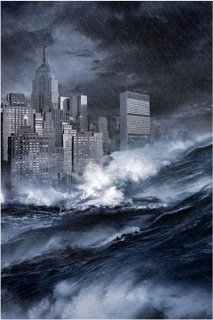
floods....

tornados...
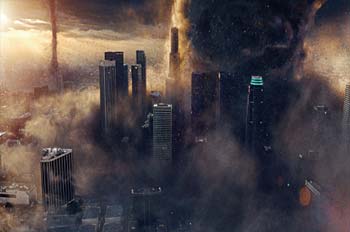
Statue of Liberty problems....
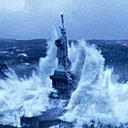
absolute devastation...

overdramatic acting...

birds....
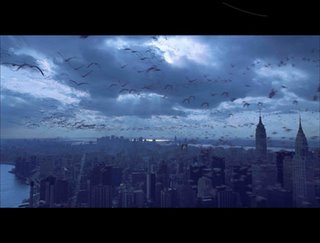
But what really sets this movie's devastation apart is its inclusion of a subplot involving wolves.

So then, a movie with this much New York devastation cannot be denied. It also cannot be denied as being one of the most absurd films of the past 30 years. Seriously, a father walks across the tundra of America's Eastcoast in order to make sure his son is doing okay. He comes with no plan to help them, but at least he comes. While they wait for Dennis Quad to show up, wolves are thrown into the mix, which might seem like a distracting subplot to some people since it has nothing to do with surviving bleak weather conditions.
That said, only The Core rivals Day After in its complete absurdity and hilarity. And that movie has nothing to do with New York, so Day After wins. It's Director Roland Emmerich's finest entry to the genre. If Independence Day was his "Sgt. Pepper," then Day After is clearly his "White Album." I'm not sure what that makes Godzilla, which he also made. The Beatles didn't make bad albums. But whatever. Let's say Godzilla is equal to Ringo's songs, even though I like Ringo more than that. Anyways, you get the point: Roland Emmerich hates New York.
Wrapping things up, New York City is probably the best city in the world and I'd be remiss if I didn't take a moment to point out that New York really has gone through some very traumatic situations over the past few years, and that if anything, these movies teach us that the worst situations can be overcome with some determination and faith.
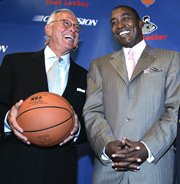
Hang in there, New York.
June 16, 2006
it's evolution, baby
And I can't help but wonder if this is evolution at work? What with all the video games and computer jobs, is it any wonder that men are losing their way? And I begin to wonder what hope is there for my future sons? Will they be even weaker than our current crop? Will technology prevent the need for muscle mass altogether?
 For those who fear for humanity's future the way I do, for those who can see the writing on the wall - that mankind has peaked and is now free falling in a tailspin back to its original algae state, I say to you, Fear Not. For the transhumanismists have taken human evolution into their own hands.
For those who fear for humanity's future the way I do, for those who can see the writing on the wall - that mankind has peaked and is now free falling in a tailspin back to its original algae state, I say to you, Fear Not. For the transhumanismists have taken human evolution into their own hands.I've now penned three unnecessary paragraphs all in order to ask the following questions: What is transhumanism? And where are the transhumanists leading us?
Transhumanism is a belief that science & technology should be used to move humanity into the next phase of its existence. It will take us so far from where we're currently at that we won't even be called "humans" anymore. Rather, we'll be called posthumans (that is, unless the posthumans don't like being named by a lesser species. Being posthuman, they will probably come up with a term that transcends our language). Monkey to Man to Posthuman...got it? Posthumans will be nearly immortal if not fully, they will barely get sick, and who knows? That's where the fun starts. Their story is yet to be written.
Perhaps we will try to add wings to future men. Or, maybe in the posthuman world, we will breathe fire out of our mouths? Don't forget about the possibility of installing computer chips into our brains. These are all potential steps that transhumanists would probably want us to consider taking. In this Slate article, those types make themselves known. One man is using science & technology to become a cat. With enough tattoos and plastic surgery, he might one day look as believable as a high school mascot.
 But let's get down to business here. We could talk about crazy trashumanists forever because their vision for mankind is really hilarious, if not entirely frightening. However, looking past the total loons out there, I'm wondering if maybe there aren't some truly legitimate ideas behind the transhumanists' thinking? Perhaps it is time for us to use our advanced technologies to enhance the human race.
But let's get down to business here. We could talk about crazy trashumanists forever because their vision for mankind is really hilarious, if not entirely frightening. However, looking past the total loons out there, I'm wondering if maybe there aren't some truly legitimate ideas behind the transhumanists' thinking? Perhaps it is time for us to use our advanced technologies to enhance the human race.For instance, I'm always hearing about humans only using 5-10 percent of their brains. I want to know what happens when that is boosted up to about 80 or 90%. That would be an evolutionary step, no?
And by boosting brain power, I'm not hoping for mankind to become smarter necessarily (I use the word "smarter" loosely here. You could argue that mankind hasn't been getting smarter at all. Tell me, what will be standing longer: the Egyptian Pyramids or the Luxor in Vegas? Granted, this point is fairly b.s. since the Luxor doesn't stand as a symbol of devolved thinking as much as it stands for the western world's need for cost-efficient immediacy. Nonetheless, i think i make a point here. Have we really been getting smarter?). Getting back to the point, who knows what might happen if we increased our brain power? Telekinesis?
We can dream and imagine all we want. Books and movies have been doing this forever. That's the fun of having evolution's direction in your hands. HG Wells explores the future of human evolution in "The Time Machine" and controlled human evolution in "The Island of Doctor Moreau." The X-Men stories are definitely a variation on this theme. In reality, we could wildly pursue similar dreams for mankind (like being able to control the weather with your eyes), experimenting and tinkering until we find an evolutionary step that makes sense. We could do that. But we shouldn't. (I'm pretty sure Wells is making a similar argument in "Moreau," although I've not exactly read it, so I might be way off.)
If we're truly reaching a crossroads for humanity, one where Darwin's evolution is old hat, the question we need to focus on is what do we wish to become? If we're going to take humanity "up a notch," we need to talk more about where we want to go. If the transhumanists are right - if human evolution is really in our hands now - then these are decisions that need to be made.
Of course, most normal people aren't ready to party with the transhumanists yet. If NASA in the 1960s was asking "In space, where do we go?" the people were probably saying, "Why go at all?" Plenty of moral objections have been made already, and I know that I'm getting ahead of the major argument of whether we should "go to space" at all. What I'm saying is, if I were a transhumanist, I might consider choosing a location to sell to the general public, instead of offering generic infinities. If you're living in the 1960s, what sounds more appealing if you're NASA selling the space program: the abstract "We want to go into outer space!" or the more refined "We want to go to the moon!"

So, to the transhumanists out there: where do we go?
(FYI: I'm not so interested in hearing from the Raelian transhumanists, because I've not been convinced you guys know what you're talking about. Cloning yourself in order to become "immortal?" Eh. I'm shrugging my shoulders. Maybe I'm alone on this one, but immortality in the human sense doesn't do much for me. Spiritual immortality, if it's possible, holds more appeal. Still, at least the Raelians are trying to have concrete ideas. Of course, they really are crazy, though. Believe me).
Anyways, getting back on track, this is the part where I tell you that I've successfully mapped the future of our species.
(Drumroll....)
We need to be better people.
We don't need to be taller or faster or develop a second thumb. I'm not sure we need to get smarter, because so far, the "smarter" we get, the bigger the bombs get.
I'd rather see the global community evolve in its moral clarity. Could we inherently grasp things like patience, tolerance, self-sacrifice, generosity, and all these types of things? Could we also add better appreciation for the arts to the list? If humanity can develop a better inherent understanding of these things, won't that do more for the state of humankind than anything else? And then guess what comes after that? We begin to operate in global harmony, mindful of things beyond ourselves as individuals but instead, we become mindful of things on a societal level! The world sings together in one enlightened voice and the old, inherently destructive nature of man is put to bed forever!

Whew.
Okay.
That might be slightly grandiose in scope. Essentially, I just stood before you and said, "Let's go into outer space!" And our goal is the moon. So then, ladies and gentlemen, I present to you the moon...
The next step in human evolution = a better sense of humor for all humanity.
Think about it. Humor is one of the greatest feats man has ever achieved. People aren't angry when they're laughing. They aren't depressed. They aren't as prone to be jerkholes to other people when they're laughing. Laughter unites people, it builds friendships and relationships. It relieves tense situations. It makes the worst moments bearable.
Think about it. Did Hitler have a good sense of humor? Of course he didn't. How about the judgmental Christian-right? Also humorless. Joseph McCarthy never laughed once; it's a proven fact.
So my challenge to the transhuman evolutionists out there is to find a way to make people funnier. Call it the gateway to moral clarity. Soon enough in our hilarious global society, people will stop tailgating on the roads, murder & war will be a thing of the past, and overly somber films like "The English Patient" will be forgotten forever.
So maybe...just maybe...unlocking that 80-90% of untapped brain power will help this cause. Or maybe there are other ways to make people funnier. I don't really know. But that's really not for me to worry about. I came up with the idea. It's up to the transhumanists now.

June 12, 2006
is it in you?
Here I am watching the replay as I write this. The Yanks are losing 2-0 after 71 minutes.
Initially, hope sprang eternal. I was humming, "My Country 'Tis of Thee" and "Star Spangled Banner," my nationalism swelling. and i watched some tall czech score against us in the first five minutes. and then later they scored again. and then we didn't score. and it was around the 57th minute that i realized i'd been sold a lie.
this US team is horrible. i don't care what they're ranked - they're horrible. it's obvious we don't belong with the Big Boys and we probably never will.
3-0. Czechs score at 75 minutes. and i've never felt so right about anything.
what's worse is they keep scrolling breaking news about Ben Roethlisberger being almost dead, but because I don't believe in stopping the tape before the game's over, I will continue to wonder if the Steeler's QB is living or dead.
you know, there's no sport as maddening to watch as soccer/futball when your team is losing. i've found myself for moments forgetting that i existed. because i don't know the game that well, i can't even tell if the Yanks are trying. it sure doesn't look like they are. it looks like they're just kicking the ball out of bounds whenever they can. i'm not confident in saying they've taken 5 shots on goal today.
we're at 82 minutes. perhaps a great miracle is in the works. then again, perhaps there isn't. OH, but look out three-time World Cup winner Italy! You will see a fierce US team this Saturday! You won't like us when we're angry!! We're #5 in the WORLD. bwahhahahahahahahahahahahahahaha..............
June 06, 2006
a bad movie lingers on the horizon
That's the description for the new romantic drama, "The Lake House," which hits theaters June 16th. What do you think about that, huh? Sounds awesome, right?
No. It doesn't.
Now granted I'm a man and I like eating meat and drinking beer. I'll grant you that. I'm not the film's target audience. But listen, I'm also known to be a sucker for certain Nora Ephron movies when they come on TBS. In other words, I will watch some of this garbage when I'm feeling all sensitive inside.
But I'm convinced "The Lake House" has gone too far.
Let's start with the premise. "Two people exchange letters and discover they're two years apart." Two years apart. Now that is an obstacle. They aren't separated by space or circumstance or emotional turmoil or any other typical Hollywood convention. They're separated by time!
There's a little thing called Suspension of Disbelief that almost all fictional films have to be aware of when they're being written, and this story has clearly gone over the deep end. Now the film's writers might argue that what they're attempting is the same as any fictional movie - like say "Star Wars" - where you have to forget about reality in order to believe the story. But I would argue that stories like George Lucas's trilogy do not violate the Suspension of Disbelief principle, despite the fact that wookies and ewoks are flying through space. "Star Wars" starts with that familiar prologue, "A long time ago in a galaxy far, far away..." In one sentence, an entire setting is established, and so too, is the audience's expectations. Said differently, the science-fiction genre was invented to host such ludicrous things as Chewbacca. But Romantic Drama is not so flexible. RomCom maybe could pull this off. Drama cannot. Remember the drama "The Boy Who Could Fly?" Actually you probably don't. But trust me, it exists and it features a young Fred Savage. And it's about a boy who can fly. And it's not a joke. It's meant to be very serious.
And guess what?
It sucks.
So that's step one: the premise doesn't fit the genre. But secondly, and more importantly, can't the conflict in this story be resolved very easily? It's not like that movie called "A Moment in Time" or whatever it's called, where Christopher Reeves falls in love with a woman who lived in another lifetime than his. As stupid as that movie is, at least it causes a real delima for the two characters involved. He can't get to the woman he loves. But "The Lake House" dilemma isn't a dilemma at all. I mean, why can't Keanu's character simply write a letter that says "Meet me at the Hilton near the freeway at eight o'clock on the first day of June?" Keanu knows this Hilton existed two years ago, and therefore should be able meet her there. Right? Maybe I'm completely underestimating the tricky nature of time-space, but if it's January 1, 2006 and I write my lover a letter telling her to be somewhere on January 5, 2006, someone explain to me where the hangup is at? I mean, if they had no means of communication, then finding each other would be a problem. Definitely. But I'm told they have a magic mailbox at their disposal.
So I'm left to believe the writers have added horrible twists and turns in order to complicate the rather simple solution to this story. Maybe Sandra Bolluck's secret admirer destroys the mailbox before Keanu can tell her where to meet up? Maybe the film will attempt something on a Back to the Future II scale, with present-tense Keanu hiding from past-tense Keanu, thereby leading to confusing stuff. I don't know.
What I do know is that the romantic duo from "Speed" will be igniting fireworks on the big screen once again. People might attack this aspect of the film, but not me. I actually like Keanu Reeves and Sandra Bullock. You know, one more movie together and they're the new Hanks/Ryan. Maybe "Speed" was their "Joe vs. the Volcano," which makes "The Lake House" their "Sleepless in Seattle." Of course, I assume that Sleepless is way better than Lake House. So I guess Hanks & Ryan are still in the lead, and there's no way Reeves & Bullock top You've Got Mail. I'm not gay.
Let's just wrap this up before I lose any more dignity. We've all seen "The Lake House" before. In its past life it was called "The Notebook" or "Waiting to Exhale" or "A Walk to Remember." My question is what will "The Lake House" bring to the table the none of those other films could? Time separation? So Keanu + Bullock + Time Separation = "Let's go see the Lake House?" Am I wrong to hate this movie before it's even been released?
